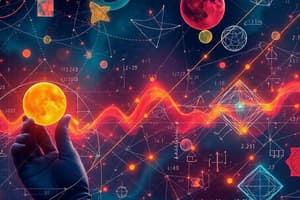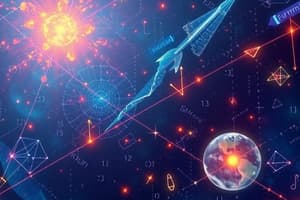Podcast
Questions and Answers
What is a key focus of discrete mathematics?
What is a key focus of discrete mathematics?
- Calculus and derivatives
- Statistical analysis of large datasets
- Objects with distinct, separated values (correct)
- Continuous variables
Which theorem is NOT mentioned as a fundamental theorem in mathematics?
Which theorem is NOT mentioned as a fundamental theorem in mathematics?
- Fundamental theorem of calculus
- Theory of relativity (correct)
- Other important theorems
- Pythagorean theorem
What is a critical application of mathematics?
What is a critical application of mathematics?
- Predicting stock market crashes using historical data (correct)
- Developing artistic techniques in sculpture
- Understanding human emotions
- Studying animal behavior in the wild
Which of the following is a component of problem-solving strategies in mathematics?
Which of the following is a component of problem-solving strategies in mathematics?
What is vital for understanding transformations in geometry?
What is vital for understanding transformations in geometry?
Which operation is not considered a core arithmetic operation?
Which operation is not considered a core arithmetic operation?
What does geometry primarily study?
What does geometry primarily study?
What is the primary purpose of calculus?
What is the primary purpose of calculus?
Which of the following represents a measure of central tendency?
Which of the following represents a measure of central tendency?
In algebra, what is typically used to represent unknown values?
In algebra, what is typically used to represent unknown values?
Which of the following is not a property of arithmetic operations?
Which of the following is not a property of arithmetic operations?
Which operation in set theory is used to find elements common to two sets?
Which operation in set theory is used to find elements common to two sets?
What do functions describe in mathematics?
What do functions describe in mathematics?
Flashcards
Discrete Mathematics
Discrete Mathematics
The study of objects with distinct, separated values, focusing on areas like combinatorics, graph theory, and formal languages.
Linear Algebra
Linear Algebra
A branch of mathematics dealing with vector spaces, matrices, and how they transform. It's crucial for solving equations and understanding geometric transformations.
Fundamental Theorems
Fundamental Theorems
Important results that form the foundation of mathematical understanding, allowing us to solve specific types of problems. Examples include the Pythagorean theorem and the fundamental theorem of calculus.
Problem-Solving Strategies
Problem-Solving Strategies
Signup and view all the flashcards
Applications of Mathematics
Applications of Mathematics
Signup and view all the flashcards
What is mathematics?
What is mathematics?
Signup and view all the flashcards
What are the core arithmetic operations?
What are the core arithmetic operations?
Signup and view all the flashcards
What is algebra?
What is algebra?
Signup and view all the flashcards
What is geometry?
What is geometry?
Signup and view all the flashcards
What is calculus?
What is calculus?
Signup and view all the flashcards
What is statistics?
What is statistics?
Signup and view all the flashcards
What is a set?
What is a set?
Signup and view all the flashcards
What is mathematical logic?
What is mathematical logic?
Signup and view all the flashcards
Study Notes
Fundamental Concepts
- Mathematics is a formal system of logic and reasoning used to quantify, structure, and understand the world.
- It encompasses various branches, including algebra, geometry, calculus, and statistics.
- Mathematical concepts are universal principles that apply to different areas of study.
Basic Arithmetic
- Addition, subtraction, multiplication, and division are core arithmetic operations.
- These operations have specific properties such as commutative, associative, and distributive laws.
- Understanding these operations forms the foundation for more complex mathematical concepts.
Algebra
- Algebra involves using symbols (usually letters) to represent unknown values.
- Equations and inequalities are key components of algebra.
- Solving equations to find unknown variables is a fundamental algebraic technique.
Geometry
- Geometry focuses on shapes, sizes, and positions of objects in space.
- Basic shapes include lines, angles, triangles, circles, and polygons.
- Understanding geometric principles is crucial for solving problems related to measurement, area, and volume.
- Relevant concepts include congruence, similarity, and transformations.
Calculus
- Calculus deals with continuous change and motion.
- Derivatives represent instantaneous rates of change.
- Integrals represent accumulated changes over an interval.
- Applications encompass physics, engineering, and economics.
Statistics
- Statistics involves collecting, analyzing, and interpreting numerical data.
- Key concepts include measures of central tendency (mean, median, mode) and measures of dispersion (variance, standard deviation).
- Probability, a sub-discipline of statistics, deals with the likelihood of events.
Sets
- Sets are collections of distinct objects.
- Set operations, including union, intersection, and complement, are essential for manipulating sets.
- Sets are useful for representing and analyzing data.
Logic
- Mathematical logic is the study of logical reasoning in mathematics.
- Truth tables and logical deductions are key tools in this field.
Number Systems
- Different number systems, such as the natural numbers, integers, rational numbers, irrational numbers, and real numbers, have unique properties.
- Number systems are crucial for representing and manipulating various quantities.
Functions
- Functions describe relationships between input and output values.
- Functions can be linear, quadratic, exponential, and many others.
- Understanding functions is crucial for modelling and analyzing relationships between variables.
Discrete Mathematics
- Discrete mathematics is concerned with objects that have distinct, separated values.
- Key concepts in discrete mathematics include combinatorics, graph theory, and formal languages.
- Includes concepts like sequences, series, and probability.
Linear Algebra
- Studying vector spaces, matrices, and linear transformations.
- Key for solving systems of equations, and understanding transformations in geometry and other subjects.
Fundamental Theorems
- Several theorems underpin mathematical understanding.
- Examples include the Pythagorean theorem, the fundamental theorem of calculus, and others that are important for solving specific types of problems.
Problem-Solving Strategies
- Developing problem-solving strategies is integral to mathematical progress.
- These include identifying patterns, breaking down complex problems into smaller parts, and creating diagrams or models.
Applications
- Mathematics is used in a wide range of fields including: physics, engineering, computer science, economics, and finance, among others.
- Mathematics provides the basis for modelling and understanding phenomena in these areas.
Studying That Suits You
Use AI to generate personalized quizzes and flashcards to suit your learning preferences.
Description
This quiz explores the fundamental concepts of mathematics, covering essential topics such as basic arithmetic, algebra, and geometry. It provides insights into how these branches interconnect and form a foundation for more complex mathematical ideas. Perfect for anyone looking to strengthen their understanding of mathematics.




